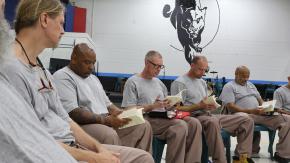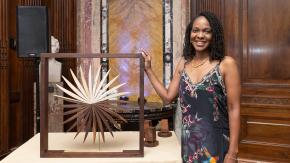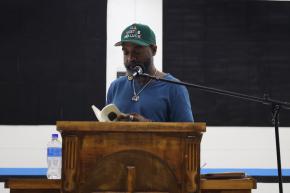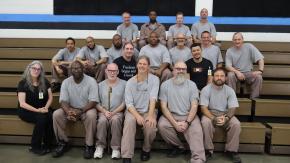
I got to be a judge for the Inside Literary Prize, a new award that gives readers in prison a chance to recognize books that matter to them.
This story was published in partnership with Prison Journalism Project, a national nonprofit organization which trains incarcerated writers in journalism and publishes their work. Sign up for PJP’s newsletter, follow them on Instagram or connect with them on LinkedIn.
HEADER PHOTO: Inside Literary Prize judges at a book discussion in North Carolina's Nash Correctional Institution. Courtesy of Freedom Reads.
Recently, books made two of my dreams come true. I got to be a judge for the inaugural Inside Literary Prize. And because of that, I got to meet one of my heroes, author and poet Reginald Dwayne Betts.
The Inside Literary Prize was established by three nonprofits—the National Book Foundation, Center for Justice Innovation and Betts’ Freedom Reads. The first-of-its-kind prize gives readers in prison a chance to recognize books that matter to them.
Three hundred readers, including me, were selected to be judges from a dozen prisons in six states.
In February, we received copies of the four National Book Award-honored books: South to America: A Journey Below the Mason-Dixon to Understand the Soul of a Nation by Imani Perry; The Rabbit Hutch by Tess Gunty; The Haunting of Hajji Hotak and Other Stories by Jamil Jan Kochai; and Best Barbarian, a collection of poems by Roger Reeves.
On Thursday night, South to America, by Imani Perry, was announced as the winner at an award ceremony in New York City.
We were encouraged to focus on our thoughts and feelings about each book rather than searching for someone else’s perspectives.
During April and May, the Freedom Reads team visited each participating prison. At each stop, they held a live book discussion, conducted the voting, and hosted literary readings and a book signing with authors previously honored by the National Book Awards.
On May 24, their final stop brought them to my prison, Nash Correctional Institution in North Carolina. We judges reported to the gym, where we sat in a circle of blue plastic chairs and spent two hours discussing the books. Steven Parkhurst, a former juvenile lifer who now works for Freedom Reads, led the discussions.
“A formerly incarcerated person is leading this,” he said, echoing what most of us were thinking. “That’s how it’s supposed to be.”
Several judges thought the Best Barbarian poems were too serious for their taste, especially in the dark environment of prison.
“Dark themes interest me, but I like dynamic characters who overcome difficulty or change in dramatic ways,” I said. “With poetry, the dynamic part is often the effect on the reader.”

On August 1, Imani Perry's South to America was awarded the inaugural Inside Literary Prize at a ceremony in New York.
Discussing South to America, one judge—a West Virginia native—said he hated it because he felt attacked by the author’s description of his home.
“This is why I love this book,” another judge said. “ It makes everyone uncomfortable.”
I understood because I also appreciate books that make me uncomfortable. They force me to dig deep within myself and evaluate my biases. We all have biases. Revealing and examining them helps us navigate them.
Natalie Green, director of programs and partnerships at the National Book Foundation, started the discussion on The Rabbit Hutch.
“So weird, disorienting; but I loved it,” she said. “I was disoriented by the separate pieces, initially, but loved the slow, painful reveal.”
I agreed with Green. The book captivated me from the start. Even though I could not make sense of the separate narrative threads, Gunty took them into her writing loom and wove a beautiful tapestry.
Another judge from Nash Correctional appreciated the Afghan perspective in The Haunting of Hajji Hotak. He recalled reading numerous accounts on Afghanistan during the past two decades, but they had been written from a U.S. perspective, which offered a limited understanding of Afghan culture. “I valued learning more about their culture, feelings and experiences.”
After two hours of discussion, each judge completed a ballot sheet with their vote and an explanation of their choice.
I love, love, love books. For a book lover, getting to be a judge for a prominent literary prize ranks high on the life experience list, almost like a sports fan winning the Super Bowl.

Freedom Reads founder and CEO Reginald Dwayne Betts speaks at North Carolina's Nash Correctional Institution.
In the afternoon, Betts, the Freedom Reads founder, read his poetry to the audience in the prison gym bleachers, then signed books.
On “The Freedom Takes” podcast, Betts has described books as a “pathway to freedom.”
He knows the truth of those words because books changed his trajectory. They led him from his nine-year sentence as a 16-year-old to becoming a published author with a Yale Law School degree.
Betts read poems from his book Felon, plus other selections. He told backstories and connected with the audience through the mutual language of incarcerated people. After a few questions from the audience, the book signing began.
While I was in the hour-long line, I mentally rehearsed what I wanted to say. When it was my turn, I handed Betts my copy of his book and told him about the impact his memoir, A Question of Freedom, had on me.
“Reading your memoir expanded my vision of possibility. Your story of accomplishing what seemed impossible helped me believe I could achieve the impossible,” I said, telling him about my college degree, my publishing successes, the writing contests I’d won and other accomplishments. “Now, I encourage others to believe they can do impossible things,” I said as I thanked him.
Betts leaned back, smiling broadly. “You made my day,” he said.
Making his day was an honor because he has helped fill my life with light. Even after two decades in the darkness of prison, my eyes and soul are brighter than ever. Books have provided a kaleidoscope of brilliant, colorful light.

Inside Literary Prize judges at the Nash Correctional Institution. Courtesy of Freedom Reads.

